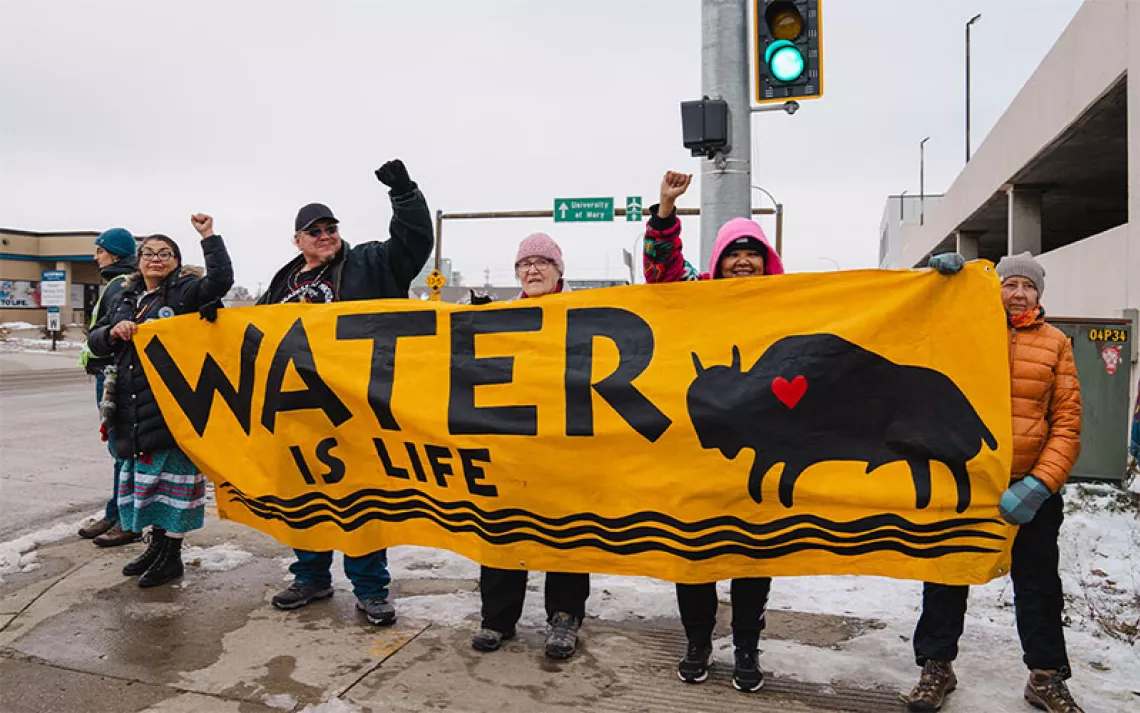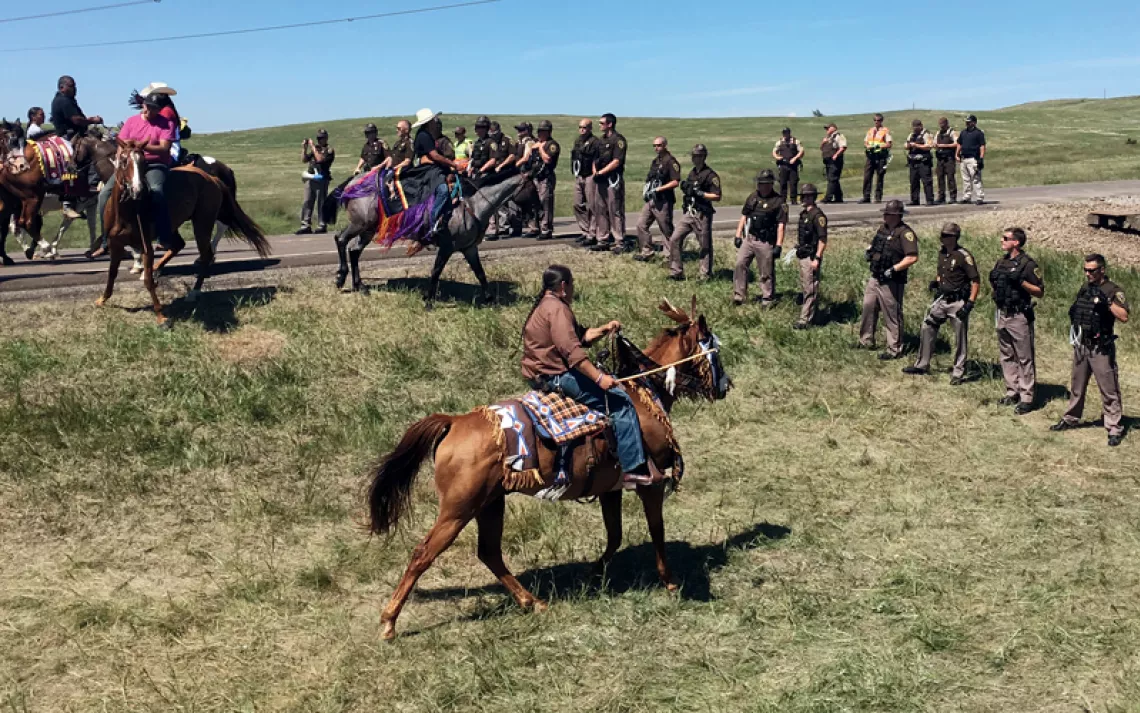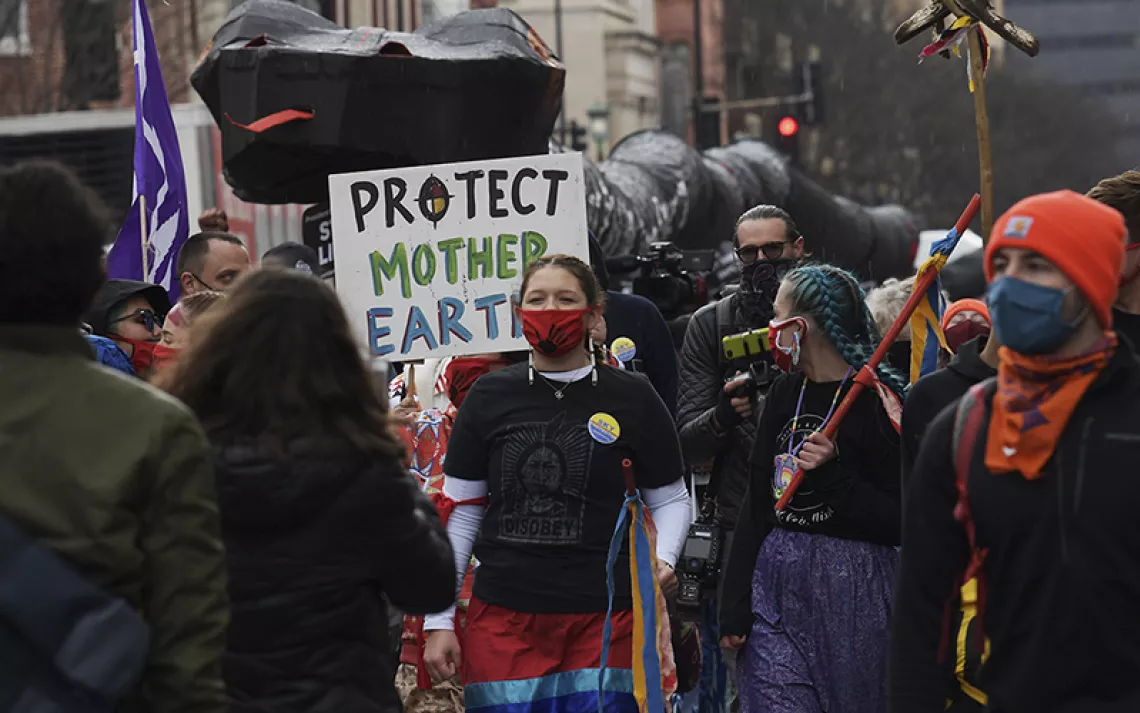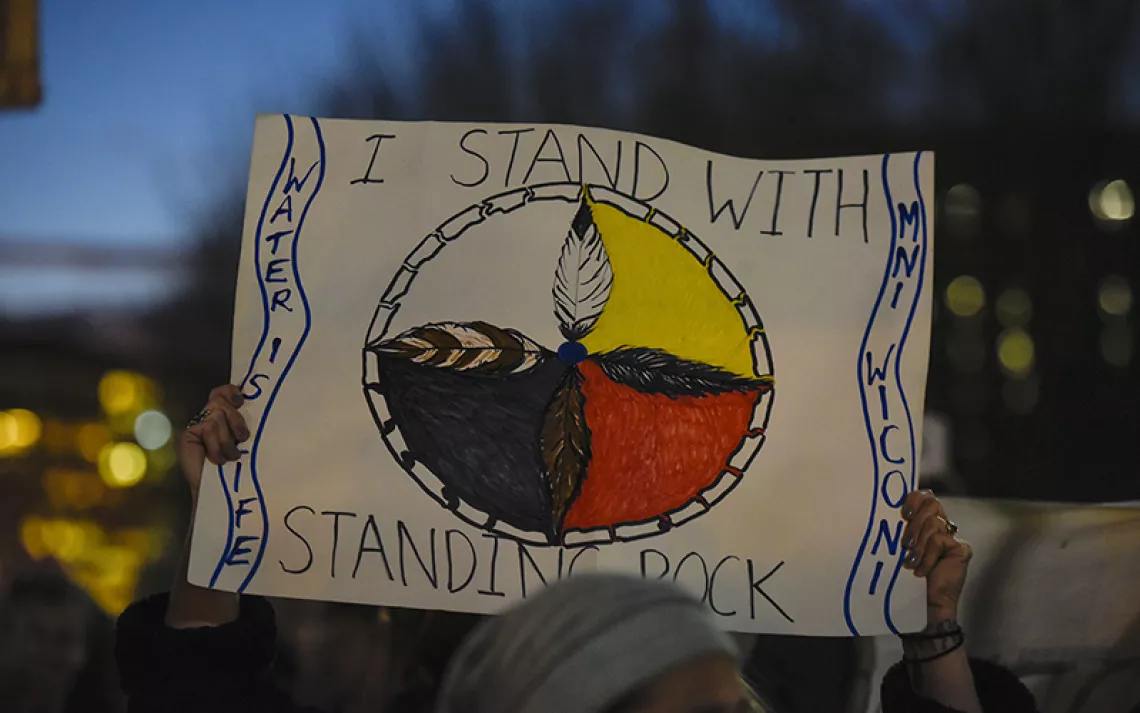Standing Rock: One Year Later
Standing Rock changed America. It also changed the people who were there.

Morgun Frejo in Stillwater, Oklahoma, and Frejo at Pawnee Camp in Oceti Sakowin at Standing Rock. | Photos by Joseph Rushmore
A little over a year ago, Morgun Frejo, a member of the Pawnee, Otoe-Missouria, and Navajo Nations, began camping at Oceti Sakowin at Standing Rock. The Missouri River is sacred to both his Pawnee and Otoe-Missouria tribes, and as a child Frejo recalls elders in both tribes telling him stories of its importance.
He lived at Standing Rock from mid-August 2016 to late February 2017, just before the camp was evicted and closed by the National Guard and local law enforcement.
When I first saw Frejo, he was working camp security at the main gate—informing people that no weapons or alcohol were allowed in the camp. Occasionally, security volunteers were asked to close the gate, or only let in a certain number of people. They also escorted people out of camp when needed, and walked with participants in the marches.
“The main focus was the safety of everyone participating in a march,” said Frejo. “So, we acted as a kind of wall between the people there and the cops, to make sure no one on our side started anything, like an agitator. We made sure we were there in unity. There would be some people who went to a march ready to be pepper-sprayed. Masked up, not showing skin, looking suspicious—when everyone else would be moms, children, elders, people in their regular clothes.”
In September 2016, Frejo was arrested, along with his uncle and several others. The police had pictures of Frejo walking away from some construction material with equipment that he could have locked himself to. He was charged with disorderly conduct, criminal trespassing, conspiracy to commit reckless endangerment (a class C felony), and conspiracy to obstruct government function. Morgun maintains he never locked himself to any machinery. His court date was scheduled for August 18, but the charges were dropped a few days before he was scheduled to appear.
I met Frejo when I was reporting on Standing Rock for The Tulsa Voice. He was tight-lipped that day; he didn't care to talk to me or the photographer accompanying me. The acquaintances who introduced us said Frejo had been a lot of help working security at camp.
One night in November, not long after I returned home from Standing Rock, a helicopter circled the area of Tulsa that I live in. My eyes snapped open in the dark. I lay there anxious. I thought of the people still camped in the cold by the river. They experienced that every single night, for most hours of the night, for months on end. Floodlights poured into camp; helicopters and small planes circled over it—intimidation and sleep-deprivation tactics. I was there only two nights. How would any of them feel when they ever heard a helicopter at night again?
When I heard that Frejo had returned to Oklahoma after Standing Rock was shut down, I wanted to ask if he was open to speaking to me. He was the only person I knew who had been there for nearly the entire arc of the camp. What the rest of the world watched transpire on poor cellphone videos and in Facebook updates, he had experienced in person.
Frejo and I talked about what was life changing—good and bad—about Standing Rock, what changed while he was there, and what survives now that the physical camp is gone.
*
LIZ BLOOD: During the time you were at Standing Rock, between August 2016 and February 2017, how did you see the camp change?
MORGUN FREJO: I saw a lot change. The first sight of it, all the teepees and the camps . . . it was a beautiful sight to see all those tribes and nations come together. The grass was like up to above our knees and a little lawnmower was going around camp so people could make little camps. Toward the end of that month into September, I was seeing more and more people coming, seeing different areas being occupied by different tribes.
Then there was the incident when they dug up those graves over the hill from camp. That was one of the first turning points. We had heard they can’t go there, they can’t bulldoze there, that they were still getting their papers. They were told there were burial sites up there. But they went up there and tore it all up.
A few of us jumped over the fence. My uncle got taken down by one of the security guards; that’s when everyone just kind of rushed in, to not only protect him but just push off the workers there. I remember walking where they turned up the ground. A bunch of the worker’s trucks were stuck in that mud. People started surrounding them and telling them to leave. One guy almost hit a woman. He got stuck and gunned it and almost hit her.
I was right behind the first row of people just going face to face with those dogs. The way the handlers were using them, they were trying to attack us. I wasn’t surprised or scared—it was almost calming. I felt like I’d been in that situation before, but I never have in my life. I talked to others and my uncle about it and he said it’s in our genetics—it’s in our DNA because of when our ancestors went through it. The best way I can describe it is that the colonizers, they had dogs. They terrorized villages. They used dogs to attack people. That experience is embedded along with all of the other tragedies and misfortune we’ve been dealt. We’ve been dealing with this for hundreds of years. So even though we were scared, we were comfortable.
Then, in October, there were more people in camp. There were more police. They were militarized. I won’t say they were antagonizing us, but they knew where to push our buttons, not as individuals but as a camp.
Camp shifted the day North Camp got raided. A lot of people got arrested. That camp was treaty land that was promised to the tribe. That’s why people moved up there. But it was also a protected route for the pipeline, so it was also a blockade camp.
They rounded those people up like cattle—pulling them out of their teepees. I had family that got arrested there. Some got pulled out of a prayer circle. A lot of their sacred items got desecrated. It’s saddening to know how Martin County and whoever else handled what is held sacred and precious. I heard stories of them desecrating it with urine, dumping it all on the ground as if it was already trash.
When Thanksgiving came around, that’s when it started getting colder. Month by month, what I noticed personally, was the spirituality—people were coming for the wrong reasons.
BLOOD: This was a change you were seeing?
FREJO: Yeah. Why I went there was for that water, you know, because that water is us. We are that water. We are made of it. I wanted to go there and pray with that water because not only is the Missouri a powerful river—but me, as a Pawnee and Otoe-Missouria Indian in Oklahoma—that same river that flows up north flows through here. It’s a sacred river to us, too.
But some that came for that call they put out—we need more people, we need more bodies; come stand on the front line; show your support that way—that’s when the mentality of camp teetered. Before it was about spirituality, listening to the elders, following a protocol of being visitors, respecting their tribe.
Then it goes to, "We have to stop this pipeline." That was always the goal, but spirituality was a main factor. It turned into yelling on the front lines, calling cops names, pigs, cussing them out. Before October, there was none of that.
There was chanting of Mni Wiconi, you know, water is life. Spirituality, prayers, and singing. Then to have to wear a ballistic vest, or walk up with a plastic shield, or goggles and a face mask so you won’t get sprayed in your face with mace or a rubber bullet, you know. People were saying Morton County had the OK to use live rounds, live ammo—instead of pepper spray. That’s what was being spread around the front line. I think that’s when people started bringing in ballistic vests. Being on those front lines, just being there, made you a target. It wasn’t about being ready to take them on; it was about being ready for whatever they were going to do.
The spirituality of it was lost more and more in the sight of the people that were there. That’s one of the major changes I saw. It was a lot of factors . . . the police escalating things, us, or certain individuals in camp that took it upon themselves to think that they were doing something justly. The cold coming in, elders leaving—or elders going so they could stay safe, you know. I think most of the camp wasn’t fully prepared for winterizing.
BLOOD: How are you dealing with not being there—a place where everyone was there for, if not the same, at least a similar reason?
FREJO: It’s an adjustment. It’s a big adjustment. Just yesterday me and my girlfriend were cooking and she mentioned it to me. She was like, "I miss that propane"—like the smell of propane, having to make sure if the tank was empty to change it out. And having a big camp bonfire, like a campfire any night or any moment for no reason. I miss it a lot. Not only focusing on like stopping the pipeline but just being there, being unified with other people for the same cause of clean water. Everyone there not judging. We knew what we were doing and we weren’t distracted.
BLOOD: This is something that, when you’re just out experiencing the world now, you flash back to?
FREJO: Yeah, it’s like a—it’s a form of PTSD. When I was up there I got arrested, me and my uncle, and we went through our own trauma up there.
I’ve talked to my grandpa, who served in Vietnam. He went through crazy things. He was MIA for a while as a POW, and he escaped. After I got arrested, I went back home for a couple of weeks in October and I was talking to him and he said, "What you went through, a normal citizen that wouldn’t happen to. What you went through, you’re basically a warrior, a soldier now."
The way I did it is kind of frowned upon in my family’s eyes because I went to jail. But they understand. They also shifted to see me as a man. They said it was good and bad. And it was along the lines of what would give you PTSD. He told me it wasn’t like what he did, but it was affecting me, taking a toll.
Even seeing a small airplane or helicopter kind of makes me uneasy, but at the same time I miss that sound because we heard it all day and all night at that camp. One of the major things that used to kind of get me was the sound of a drum, hearing that outside of camp brought up a lot of feelings.
I’m still working through my own things. From talking to other people that were up there, it’s not only things like that that trigger; it’s that feeling of loneliness or depression . . . not feeling useful or having a purpose anymore because at camp everyone had a purpose.
BLOOD: So even the feeling can then be triggering. Is that what you’re saying?
FREJO: Yeah. That’s what hits me personally and some others that I know . . . that everyone’s just kind of feeling useless or empty or just alone like no one understands. I still deal with the depression of missing camp, not knowing how to deal with society.
My anxiety builds up over time and sometimes hits me a lot, like for a night. That feeling of being paranoid. I try not to be mad at myself for feeling like that. I think, I’m out of camp so I shouldn’t feel like this anymore. But I’m starting to realize every person who went to camp, no matter what they heard or saw or experienced—we won’t fully heal from that, because we’re still feeling what our ancestors felt. It’s like coming to terms and being at peace, and understanding all that, to try to find a healthy way to let it go or deal with it.
Just about every time I open up Facebook, you know, I’m seeing someone that I know from camp posting about what they’re going through and they’re wondering if everyone else or anyone else feels like that. It’s an epidemic that we all have. Everything that happened up there takes a toll, and it’s gonna take time to heal.
Thinking about it now, it’s crazy to think about two or three days of not really eating, drinking, or barely sleeping. I reflect and know I did that for the right reasons. I wasn’t out partying or going on a bender. I wasn’t thinking about eating or drinking water, either, but when I did I loaded up because I didn’t know when the next time would be. But I didn’t worry about it, either.
You know, what I was a part of up there in Standing Rock, it woke up the world. There’s other camps everywhere now. There’s people taking on big oil companies. There’s marches. There’s rallies. People are waking up to what has been happening here in Oklahoma for over a decade.
BLOOD: Where are you at right now?
FREJO: I’m working on myself—emotionally, physically, and spiritually, and knowing what I can do and when I can do it. I know that, how many people have seen the light on what’s going on and what’s happening. It’s an amazing feeling to know that there’s so many people, not only in the U.S. but all over the world, that come up with inventions or a new way to get away from fossil fuels. I feel small but at the same time, I’m part of something way bigger.
I have to take a step back. I know that I can’t do much or I can’t do what I truly want until I know that me and what I hold dear to me are ready. So I’m kind of keeping an eye on everything, but at the same time trying to take time for myself to make sure I heal and just be ready for whatever opportunities I have in the future.
BLOOD: How are people who are now gone from camp continuing to support each other?
FREJO: Keeping in touch with other protectors or other people from camp. I think that’s one of the major ones. A lot of them are . . . just continuing the fight, going wherever they can or showing support where they can. I think a lot of them are trying to keep that momentum. But it’s really hard because just that feeling of, you know, no on will understand. No one gets it.
But at the same time, it’s up to the individual to either reach out or accept someone trying to support them . . . I know what else is out there. When they don’t take that road, they go to self comforting, what they know. It could be alcohol, drugs, self harm or harming others. That’s a big problem, too, because a lot of natives, not only on reservations or in a small town, sometimes where we live, it’s just overbearing. It’s depressing . . . there’s a lot of suicides. Just that hope, you know, of what it was like in camp. And then you go back to where you’re from and there are people that, you know, they’re like, "Why’d you go up there?" That doesn’t involve us. It’s really rough.
But as water protectors, and as a human race—have that compassion of reaching out to someone. They may look like they’re having a good time or they’re enjoying themselves, but who knows what they’re feeling on the inside . . . they could have a whole story that no one knows about.
Here, I walk to the gas station, or Walmart, or the store, and no one makes eye contact. They’ve got their ear buds in. No one wants to give you the time of day to look at you. But at Standing Rock, man, you’d wake up, get out of your tent, someone’s walking by—"Hey, good morning, how you doing?" Even when everybody just woke up . . . you could walk around camp and someone would offer you coffee and you’d sit there and get to know them.
That’s a major difference I’m still trying to get used to. Because before Standing Rock I was like that, you know. I wouldn’t look at people. I’d just do what I had to do and then leave . . . but after Standing Rock, I look at people. I’ll give 'em like a little nod and be like, "Hey, how ya doin?"
That little interaction of just saying hi or smiling at someone, you know? Maybe they’re going through a rough day. I know when someone does that back I feel better. I like seeing someone else smile. Maybe they’ll do it to the next person. Just that little happiness makes the world a little bit better.
 The Magazine of The Sierra Club
The Magazine of The Sierra Club



